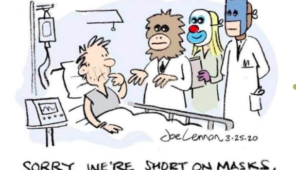Top 10 tips for black Wednesday survival..and beyond
We hear from Medic Footprints' Director, Dr Abeyna Bubbers-Jones, as she shares her top 10 tips for black wednesday survival.
We hear from Medic Footprints Director, Dr Abeyna Bubbers-Jones as she shares her top 10 tips for Black Wednesday survival…
_________________________________________________________
I started my working career in medicine 10 years ago to the day.
My… time has flown by… and I’m still classified as a junior doctor, despite having worked every single year of those 10 years in medicine. This is what changing specialties and seeking other opportunities does to you.
Nevertheless, it illustrates that medicine is not a treadmill or elevator to the holy grail. Although the system is ultimately designed like that, the choice is yours on how you decide to go about it.
Reflecting on my years working in the NHS and seeing in Black Wednesday, I impart some tips on surviving the system which is now more challenging and equally more rewarding than it’s ever been.
This article is perhaps a little bit more upbeat than my Huffington Post reflection..
TOP 10 TIPS FOR BLACK WEDNESDAY
10. Actively seek out a mentor

This person will be the influencer that will help you make the right decisions for you in your career. Once you’ve found them, this could be a life long relationship. Don’t confuse an educational supervisor with a mentor. They are NOT the same thing (but can be).
9. Sign up to a career coach
Do this early as possible – you can get one free from your Professional Support Unit – usually at least 4 sessions. Career coaches are great for anybody, regardless of career stage or whether you’re happy with your pathway or a bit lost in where to go.
Watch a short video clip from our Career Coaches networking event in 2015.
8. When you make a mistake, feel free to blame yourself if necessary – but recognise that there are plenty of other people involved too!

When medics make mistakes, they have a tendency to take the train on a downwards spiral to self deprecating hell. Sometimes this journey is part of the learning curve, however there’s no need to revel in it. Learn about the swiss cheese effect, then honestly reflect on how the mistake came about and what can be done to avoid it in the future. It’s rarely ever one person’s fault! I strongly recommend you then pursue an open discussion about the incident with the right people.
7. Be prepared to have difficult conversations

This is a skill that very few people actually master in their career, let alone life.
I’m not talking about breaking bad news to patients. I’m referring to conversations you have with your colleagues, patients, family and friends about topics that you are emotionally invested in. Your career, your actions, your family, your relationships with individuals. Topics that you’re afraid to talk about (you know which ones they are because you actively avoid them). Ie. what happens if you think your senior is wrong or you believe that a patient is making the wrong choice in their treatment plan? Or if you have to consider moving to the other side of the country for your job? Or you’re contemplating leaving medicine?
My advice – practice, practice, practice. The mistake most people make, is not having them.
6. Know when you need help… and most importantly, when to get it!

Everyone has a generally good idea of when they’re starting to struggle, but few actually act upon it and continue to struggle in silence. Most seek help when they’ve passed an easily reversible state (e.g. burnout).
The most important take-home here is self-awareness. Know the signs and know what to do about them.
Each NHS trust has an Occupational Health service where you can seek help if you have a health problem, interpersonal relationship or stress which is affecting your work. Alternatively there’s a Professional Support Unit in every deanery if you’re a trainee, BMA services and/or your local GP. Some regions have a bespoke service for doctors, such as Practitioner Health Programme. Check out this page for more info on doctors’ wellbeing or put out a post on your local Tea and Empathy group on facebook. If you’re unsure – check with your Postgraduate Medical Education Centre.
5. Your seniors are probably more stressed than you are

Trainees are one of the most vulnerable staff groups in hospitals, however we shouldn’t forget that all healthcare staff demonstrate vulnerabilities of sorts. The insurmountable challenges and demands in the NHS mean that there’s more hands-on work, responsibilities, legalese, admin, on calls etc for all involved. The culture has changed faster than the people in it – so much so this proves a significant stressor for most on the ground. Hence if you ever feel alone – don’t forget that there are several people who highly likely feel the same and are using their coping strategies every day in attempt to manage it.
4. If you feel that medicine isn’t for you – it’s likely you haven’t found the right career pathway yet

If you’ve completed a medical degree and in the early throws of your working career as a doctor, remember that the next few years is another transition which will conjur all sorts of emotions.
The seemingly ‘negative’ emotions may be,
“I can’t do this anymore / I’ve wasted the last 5+ years of my life and have to start from scratch in something else / I don’t think I’m good enough for this / if I consider leaving I’ll be seen as a traitor to the profession “
Medicine is a ridiculously diverse career to enter, and you’ll find simply by browsing this site, that there’s plenty #moretomedicine than you’re ever exposed to as a junior doctor. Besides there being limitless opportunities for doctors, there are also a number of employers besides the NHS that would be grateful for your services – as a doctor or not.
3. Work/life balance isn’t an option, it’s a necessity

The trick to surviving a busy workplace is to have a life outside medicine. Sounds pretty simple, but it really is paramount. Most doctors I see in the course of their work (including myself in the past), have otherwise abandoned their former life in favour of a gruelling rota.
What they don’t realise is that your hobbies, passions and connections outside of work are essential in order to successfully balance life at work. Your raison d’etre need not be invested in one thing only – remember your identity and your values – this is your brand which you will carry for life and help you navigate those tricky obstacles within and outside the workplace.
2. Have breaks at work.

My breaks at work used to mean I would walk down the corridor from clinic to theatre with a sandwich in my mouth. This is not a break.
Unfortunately the structure & function of most doctors’ messes have changed, and they’re no longer the haven they once used to be. However, take what you can get. Take a few moments of the day to switch off, breathe and indulge in some headspace. You’ll really thank yourself for it in the long term. Keep hydrated (we hear the all too common story of doctors going into obstructive or pre-renal renal failure) and well nourished.
1. Enjoy every single f*cking moment!
Yea! You’re in arguably the most diverse, rewarding and challenging job in the world. Whether you’re on the ups or downs of that rollercoaster – remember it has and will always be a thrilling ride!
.. and don’t forget that you can jump off and back on any time you wish! Good luck!
Sara Sabin
Latest posts by Sara Sabin (see all)
- 4 Common Mistakes Doctors Make on their Non-Medical CVs - 25th November 2020
- Top 10 tips for black Wednesday survival..and beyond - 3rd August 2016
- 10 Mistakes Doctors Make When Applying for Management Consultancy - 26th June 2016


